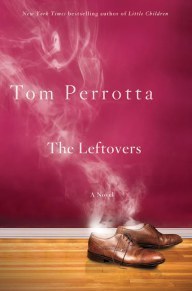Some stuff we missed in 2011
Because we work full-time–and spend what little free time we have pretending to be real-life writer-type people (like those Sex and the City chicks!)–it's hard to cover even a fraction of all the books released each year. This was especially true for 2011, which saw a huge range of works from some very talented authors, as well as a few clunkers. Let's start there:
A Lost Memory of Skin by Russell Banks
 It was the premise that got me: our protagonist, known only as the Kid, fresh out of prison for a sexually-based offense, moves into a homeless camp beneath a Florida overpass, where he is forced to wear a tracking device on his ankle. After a police raid on the camp, the Kid befriends an enigmatic sociology professor, who is drawn to him because of his similarities to Huck Finn. To be sure, this is a stunning premise, full of wit, suspense, and the kind of compassion for characters that very few authors can pull off, particularly when the characters are as reprehensible as the Kid. The problem, however, lies in the prose; clunky, lumpy, and dry, it bumbles on seemingly without direction (until almost halfway through the 400+ page book), nudged along by a plot that at times demands a little too much suspension of disbelief from the reader. Also, Banks seems to have some aversion to commas–a stylistic technique, no doubt, intended to underscrore the Kid's wild nature, but really it just makes the prose difficult to follow through much of the book.
It was the premise that got me: our protagonist, known only as the Kid, fresh out of prison for a sexually-based offense, moves into a homeless camp beneath a Florida overpass, where he is forced to wear a tracking device on his ankle. After a police raid on the camp, the Kid befriends an enigmatic sociology professor, who is drawn to him because of his similarities to Huck Finn. To be sure, this is a stunning premise, full of wit, suspense, and the kind of compassion for characters that very few authors can pull off, particularly when the characters are as reprehensible as the Kid. The problem, however, lies in the prose; clunky, lumpy, and dry, it bumbles on seemingly without direction (until almost halfway through the 400+ page book), nudged along by a plot that at times demands a little too much suspension of disbelief from the reader. Also, Banks seems to have some aversion to commas–a stylistic technique, no doubt, intended to underscrore the Kid's wild nature, but really it just makes the prose difficult to follow through much of the book.
The Leftovers by Tom Perrotta
 I've read every single thing that Tom Perrotta has ever written, and I will continue to do so, as long as he continues to write books like The Leftovers. An interesting departure from the author's customary Cheeveresque comfort zone, The Leftovers is is at once a new take on the post-apocalyptic genre and a subtle skewering of that Left Behind series, in which the "survivors" of the Rapture have to contend with their wretched lot (and the rise of the antichrist). "The leftovers," in this case, are exactly that–those people left behind after a Rapture-like event, as the critics are fond of calling it, empties the planet of several billion people. In fact, that term–"Rapture-like event"–is strikingly appropriate since Perrotta does not preoccupy his characters with theological speculations as to why all these people just up and vanished. Rather, the book focuses on societies' efforts to rebuild, to forge ahead in the wake of what, at the end of the day, is really an immense tragedy. Perrotta navigates the story with a deft kind of humor (for example, the hipsterish doomsday cults that have sprung up in response to the "event"), as well as the same dramatic precision that one would expect from the author of Little Children and The Abstinence Teacher. And while the plot does edge toward the convoluted side, especially in regard to those cults, The Leftovers is ultimately an extremely enjoyable read.
I've read every single thing that Tom Perrotta has ever written, and I will continue to do so, as long as he continues to write books like The Leftovers. An interesting departure from the author's customary Cheeveresque comfort zone, The Leftovers is is at once a new take on the post-apocalyptic genre and a subtle skewering of that Left Behind series, in which the "survivors" of the Rapture have to contend with their wretched lot (and the rise of the antichrist). "The leftovers," in this case, are exactly that–those people left behind after a Rapture-like event, as the critics are fond of calling it, empties the planet of several billion people. In fact, that term–"Rapture-like event"–is strikingly appropriate since Perrotta does not preoccupy his characters with theological speculations as to why all these people just up and vanished. Rather, the book focuses on societies' efforts to rebuild, to forge ahead in the wake of what, at the end of the day, is really an immense tragedy. Perrotta navigates the story with a deft kind of humor (for example, the hipsterish doomsday cults that have sprung up in response to the "event"), as well as the same dramatic precision that one would expect from the author of Little Children and The Abstinence Teacher. And while the plot does edge toward the convoluted side, especially in regard to those cults, The Leftovers is ultimately an extremely enjoyable read.
The Fates Will Find Their Way by Hannah Pittard
 Easily one of the best books of 2011, this one surprised me. I'm guessing it was Eugenides' The Virgin Suicides that made first-person inclusive tense so fashionable (see: Justin Torres' We the Animals), and so naturally I had already decided before reading that this book was simply another spin-off of that ilk. However, in the same way that Suicides was so powerful because of the first-person inclusive, so too does Fates' collective narrative voice make it resonate. The story begins with the disappearance of 16-year-old Nora Lindell, but the book's focus is the teenage boys who knew her and admired and/or resented her. Moving back and forth through time, the narrative tracks the lives of these five young men and the ways in which Nora's disappearance (which quickly becomes a secondary issue in the book) has contributed to their transition into adulthood. Paralleling this is a gorgeous hypothetical narrative about what might have happened to Nora–or perhaps what these young men would have hoped happened to her, if only to put their own minds at ease about the probable circumstances of her vanishing. Pittard's prose is swift, elegant, and the characters frighteningly plausible in their fear, hopefulness, resiliency, and foolishness. The Fates Will Find Their Way is one you don't want to miss.
Easily one of the best books of 2011, this one surprised me. I'm guessing it was Eugenides' The Virgin Suicides that made first-person inclusive tense so fashionable (see: Justin Torres' We the Animals), and so naturally I had already decided before reading that this book was simply another spin-off of that ilk. However, in the same way that Suicides was so powerful because of the first-person inclusive, so too does Fates' collective narrative voice make it resonate. The story begins with the disappearance of 16-year-old Nora Lindell, but the book's focus is the teenage boys who knew her and admired and/or resented her. Moving back and forth through time, the narrative tracks the lives of these five young men and the ways in which Nora's disappearance (which quickly becomes a secondary issue in the book) has contributed to their transition into adulthood. Paralleling this is a gorgeous hypothetical narrative about what might have happened to Nora–or perhaps what these young men would have hoped happened to her, if only to put their own minds at ease about the probable circumstances of her vanishing. Pittard's prose is swift, elegant, and the characters frighteningly plausible in their fear, hopefulness, resiliency, and foolishness. The Fates Will Find Their Way is one you don't want to miss.











